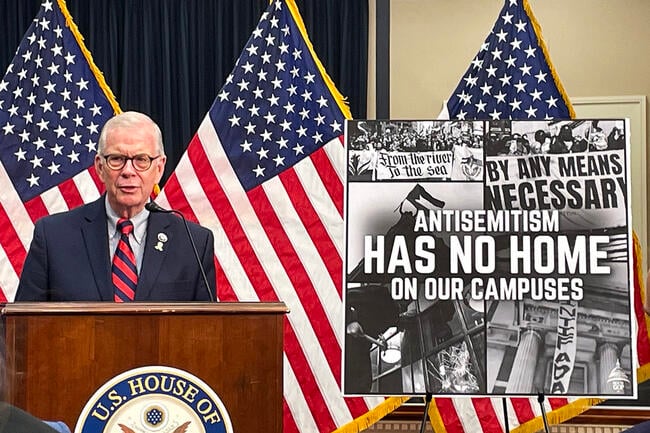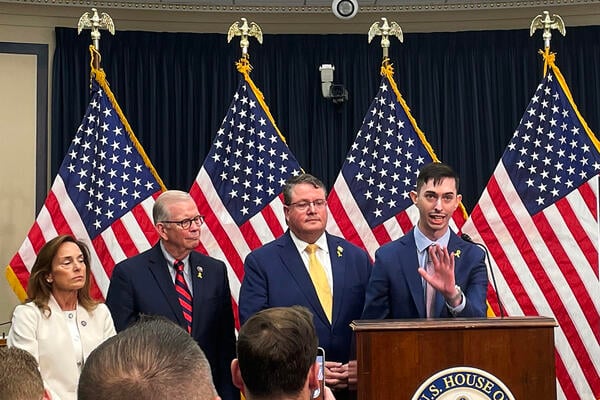You have /5 articles left.
Sign up for a free account or log in.

Republicans held a press conference Tuesday ahead of a campus antisemitism hearing where Rep. Tim Walberg accused Cal Poly, DePaul and Haverford of failing to protect Jewish students.
Josh Moody
Almost a year after the last hearing on campus antisemitism, Congress is again taking aim at colleges they say have become hotbeds of anti-Jewish harassment and discrimination.
This time, lawmakers are targeting California Polytechnic State University, San Luis Obispo; DePaul University; and Haverford College. Presidents from all three institutions will testify at a congressional hearing today.
In the last round of hearings, Congress focused on some of the country’s wealthiest and most visible institutions. First up, in December 2023, the presidents of Harvard University, the University of Pennsylvania and the Massachusetts Institute of Technology faced a grilling over their handling of pro-Palestinian campus protests related to the war between Israel and Hamas and related concerns about antisemitism.
Columbia University’s president and board co-chairs were in the spotlight in April 2024, followed a month and a half later by the leaders of Northwestern University, Rutgers University and the University of California, Los Angeles. Presidents of five of those seven institutions have since stepped down (though one was already headed toward retirement).
Now Congress is turning its attention to Cal Poly, DePaul and Haverford—three universities that seem to have little in common and are not typically in the national spotlight. So, how did Congress land on them?
In the Crosshairs
In letters to Cal Poly, DePaul and Haverford, Congress told campus leaders that events related to pro-Palestinian protests raised questions about their compliance with federal civil rights laws.
In all three letters, the Republican-led Committee on Education and the Workforce cited alleged instances of antisemitism and noted failing grades on the Anti-Defamation League’s Campus Antisemitism Report Card: Both DePaul and Haverford received an F, while Cal Poly earned a D.
At a packed press conference in the Rayburn House Office building on Tuesday, committee members blasted college presidents broadly for failing to protect Jewish students on campus.
Committee chairman Tim Walberg offered insights into why those three institutions were selected. He accused Haverford of committing “some of the worst atrocities that you could expect upon human beings, Jewish students and supporters of Jewish students on their campus.” At Cal Poly, he said, faculty joined protesters in blocking students from classes; he also made vague references to violence on campus. At DePaul, he highlighted the story of Michael Kaminsky, a Jewish student allegedly attacked on campus for his support of Israel, who joined the press conference to express his concerns.
“People have said, ‘Why do you carry [these hearings] on?’ We said, ‘We have to,’ and we have to show it’s not just at the elite Ivy League institutions or Northwestern University, or some that we had in front of us, but it’s all over,” Walberg said, arguing that antisemitism was also seeping into K-12 schools.
“It’s clear that Jewish students are still not safe on their campuses,” Kaminsky said.

From left: Lisa McClain, Tim Walberg, Randy Fine, Michael Kaminsky.
Josh Moody
Tuesday’s press conference also prompted protests. Two women were kicked out before it started, one wearing a keffiyeh and the other a T-shirt calling out the deaths of thousands of children in Gaza. At times, protesters could be heard speaking loudly outside the press conference. After the event, pro-Palestinian demonstrators clashed with attendees and supporters of Israel; Capitol Police threatened them with arrest for disorderly conduct.
Lisa McClain, a Michigan Republican, said Wednesday’s hearing would be about accountability.
“As a member of the committee, I look forward to asking those presidents what they are doing and what they intend to do about the rise of antisemitism on their campuses, and if they’re not doing anything, then I have a question: Why should they receive federal funding?” McClain said.
But some individuals tied to alleged instances of campus antisemitism have refuted those claims. The committee’s letter to Haverford cites a talk given on campus last October by Rebecca Alpert, a professor emerita of religion at Temple University, titled “Judaism Does (Not) Equal Zionism: Exploring American Jews’ Complicated Relationship to Israel/Palestine.” According to the committee, Alpert’s talk prompted complaints that “it promoted a culture of antisemitic discrimination.”
But Alpert, who is a rabbi, said her talk focused on the history of Jewish American anti-Zionism. She argued that Zionism was a minority position in the U.S. Jewish community until after the Holocaust and the establishment of the state of Israel; it did not gain a broader hold until the Six Day War in 1967.
“My argument is basically that Zionism is not intrinsic to Jewish life. It is a political ideology that supports an ethno-national state in Israel,” Alpert said.
She called it “ludicrous” that she was accused of spreading antisemitic discrimination.
Alpert argued that Congress is conflating antisemitism with legitimate critiques of Israel. She believes the government’s stated goal of protecting Jewish students is disingenuous; instead, it’s part of “a concerted effort to destroy higher education” driven by the Trump administration, she said.
Institutional Responses
Ahead of their appearance on the Hill, the leaders of Cal Poly, DePaul and Haverford all made public statements emphasizing the actions they have taken to address concerns about antisemitism and keep their campuses safe.
“Combatting antisemitism is a high priority for Cal Poly, and I look forward to sharing with committee members the significant steps we’ve taken to maintain a safe and secure environment for our entire community,” President Jeffrey Armstrong said in a statement.
A DePaul spokesperson wrote by email that “President [Robert] Manuel looks forward to having the conversation with our lawmakers and describing all that DePaul has done to confront antisemitism on campus.” He will also share actions DePaul is taking to improve its climate.
“Combating antisemitism requires vigilance, humility, and a commitment to continuous learning,” the spokesperson wrote. “We have implemented systemic changes designed to eliminate antisemitism at DePaul and affirm our values of safety, belonging, and shared responsibility. Some of these include implementing a new Identity Verification Policy, appointing a Special Advisor to the President on Jewish Engagement, creating an Antisemitism Taskforce, and starting a Jewish alumni affinity group to build meaningful connections among Jewish graduates.”
The new identity verification policy, announced Friday, requires students and employees to “temporarily remove masks or face coverings upon request from a Public Safety officer.” The announcement noted that “masked harassment” has been an issue on campus.
(Congress asked all three institutions about their masking policies in the individual letters.)
A Haverford College spokesperson told Inside Higher Ed, “We appreciate the work of the Committee and the opportunity to engage with them in meaningful dialogue” at the hearing.
Haverford president Wendy Raymond also released a statement Friday.
“Let me be clear: every member of the Haverford community deserves to feel safe, welcomed, supported, and inspired to pursue their academic and professional goals. Since Hamas’s terrorist attacks in Israel on October 7, 2023, our nation has seen a troubling rise in antisemitism,” she wrote in a message to campus. “We have also witnessed an increase in anti-Muslim hate and other forms of bias. Haverford has not been immune to these challenges, and I want to affirm our commitment to confronting hate and discrimination in all its forms.”
Raymond also listed actions she has taken to address antisemitism, including changes to campus policies and engaging with local and national Jewish groups, including the ADL.
And she apologized to those the college failed, writing, “To anyone in the Haverford community who feels that we could have done more, or that I didn’t take a more assertive role in the face of actions running counter to our values and Honor Code—I hear you and acknowledge that we can do better, and I can do better. To Jewish members of our community who felt as if the College was not there for you, I am sorry that my actions and my leadership let you down.”
Now Raymond and her peers will have to show Congress their concerns have also been heard.




